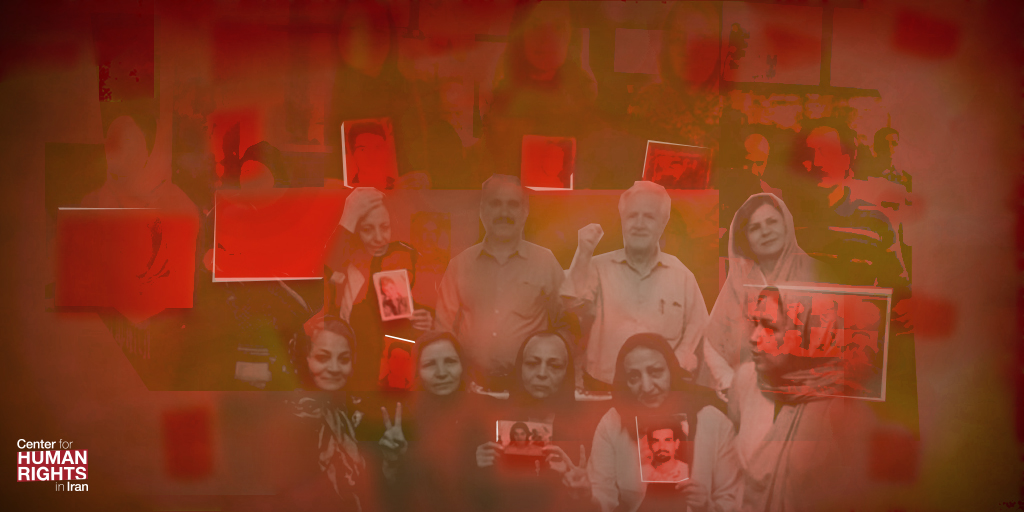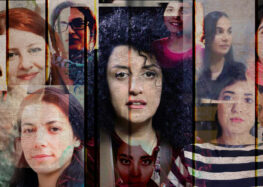These Women and Men Inspired Us All
A grieving mother who vowed to continue pursuing her slain son’s pursuit of freedom. A housewife who lost her life while trying to save a victim of state violence. A prisoner of conscience who risked the last few freedoms she has to demand justice for her people… Alongside the cases of harrowing rights violations in Iran that we document each year are stories of stunning courage, hope and resilience. As 2019 draws to a close, the Center for Human Rights in Iran would like to honor those who refused to be silenced or defeated by sharing their words and stories. Here’s to all the Iranian women and men whose fearless pursuit of freedom and justice inspired us all to keep striving for a better future.
Grieving Mother Turned Activist Refuses to Be Silenced
After her son was killed by Iranian forces at a street protest in 2009, Shahnaz Akmali devoted her life to pursuing justice for victims of state violence. This month, after being summoned to prison to serve a pending sentence for visiting a grieving mother whose child was killed by state forces this past November, Akmali tweeted, “When I was being interrogated, they told me to forget I ever had a son. I said I can’t forget…Today I have sons and daughters throughout Iran.”
Selfless Housewife Loses Life While Helping Wounded Protestor
An unarmed civilian and mother of three young children, Ameneh Shahbazi was killed by a bullet as she was trying to help a person shot in the leg during a protest. The 34-year-old housewife had gone shopping when she encountered a protest against the increase in the price of gasoline in the Sarasiyab district of Karaj on November 17. “My sister had gone to buy some medicine. On her way back, there was a commotion on Iranzamin Street and someone had been shot in the leg. Ameneh was attending to the man’s wound when she was hit by a bullet from behind,” said her brother.
Mother of Slain Protester Vows to Continue on His Path
The mother of Pouya Bakhtiari, a 27-year-old man shot and killed by security forces in the Mehrshahr district of Karaj on November 16, pledged to continue her son’s pursuit of freedom in the wake of his death. “I knew what could happen in these protests and disturbances. We chanted slogans and walked along with the people,” said Nahid Shirpisheh, who joined her son when he went into the streets last month before being shot there. “He lost his life when his blood was spilt but out of respect for his soul and his ideals, I will continue on this path as his mother as long as I’m alive,” she said. “I think if I don’t do that, I wouldn’t be a good mother.”
Rights Defender Courageously Condemns State Violence from Prison Cell
Fearless human rights defender Narges Mohammadi was sentenced to 16 years’ imprisonment in Iran because powerful officials feared the power of her words and hoped to silence her. They failed. From her cell in Evin Prison, Narges issued a stinging condemnation of the Iranian government’s violent repression of November’s protests, knowing full well that she could be punished in jail for taking a stand. “The killing of the people, battered and exhausted under oppression, has been so vicious and violent that the state cannot offer any kind of justification,” she wrote. “There can only be one demand and that is the punishment of those responsible for the massacre of defenseless people. This must become a national call.”
Iranians Honor “Blue Girl” Who Resisted State Ban on Women in Stadiums
Women in Iran made history this year when thousands watched a football game in Tehran’s Azadi Stadium after being banned for 38 years. Their presence this past October was the result of decades of resistance by Iranian women, including Sahar Khodayari, who died after setting herself on fire outside a courthouse where she had been summoned in relation to her arrest at a stadium earlier this year. Sahar came to be known as the “blue girl” because that was the color of her favorite football team, and women loudly chanted “blue girl” from inside Azadi Stadium in October. Iranian men also honored Sahar, with soccer teams holding public moments of silence and celebrities including national football legend Ali Karimi urging all Iranians to boycott stadiums to protest her death.
Seat Left Empty at G7 Gender Equality Summit for Imprisoned Lawyer Nasrin Sotoudeh
A seat was left empty for imprisoned defense attorney Nasrin Sotoudeh at a meeting of the G7 Gender Equality Advisory Council at the Elysee Palace in Paris days before the human rights defender was sentenced to 33 years in prison, 12 years of which she must serve. President Macron had personally invited her to join the council, which includes three Nobel Peace Prize winners, to advise on combating violence against women and promoting girls’ education and women’s entrepreneurship around the world. “From here, behind bars, I also send greetings and kisses for my compatriot women who are non-violently struggling through this arduous path, and attempt to end compulsory hijab,” wrote Sotoudeh in a letter from Evin Prison. “Let the world watch our unified struggle towards achieving a basic and common right. The right will be returned to us, not in a distant future.”
Muslim Councilmen Defy State Taboo of Defending Baha’i Rights
A young Muslim city councilman from Shiraz began serving a one-year prison sentence earlier this year for publicly seeking the freedom of two detained members of the Baha’i faith, a religious minority that is severely persecuted in Iran. Dozens of prominent human rights defenders called for his release, including Isfahan councilman Mehdi Moghaddari, who was suspended from his seat for six months after defending Hajati. “Some don’t understand or don’t want to understand that having rights does not necessarily mean being right,” wrote Moghaddari. “Every human being, whether we like his or her beliefs and ideas or not, has certain rights, the most important of which is the right to due process. Defending those you oppose is the definition of liberty.
Parliament Removes Discriminatory Paternity Requirement from Citizenship Law
After years of advocacy efforts by children’s rights groups, tens of thousands of Iranian children born to fathers from foreign countries became eligible for citizenship after Parliament approved legislation allowing citizenship to be passed on by mothers. Previously, Iranian citizenship was only granted based on paternity, leaving children with foreign fathers without the identification documents needed to obtain essential state services including medical treatment and education.
Isfahan Court Deems Denying Motorcycle Licenses to Women Unlawful
In response to a complaint by a woman from the city of Isfahan, Branch 1 of Iran’s Administrative Justice Court ruled that denying motorcycle licenses to women is unlawful. The ruling would have to pass several stages before setting a national precedent, but this first step is significant. “For the past few years, we have been trying to get a motorcycle license,” the plaintiff, Fatemeh Eftekhari, wrote on her Instagram account. “We hope to move forward until we get a final ruling because we believe that using a means of transportation, such as a motorcycle, should be lawfully possible for all members of society.”
Special National Orchestra of Iran Tours Multiple Citie
Featuring musicians and singers with disabilities, the Special National Orchestra of Iran was invited to several cities throughout the country this year after its successful performances in Tehran and Mashhad. Led by female director Maryam Gilasian, the orchestra includes females and males of all ages and is attracting talent from around the country. “We wish for the group to reach a point to be able to perform on an international level,” said Benyamin Aqatabai, a guitarist who also has law degree, in a mini-documentary on the orchestra produced by Can-Do Musos.







